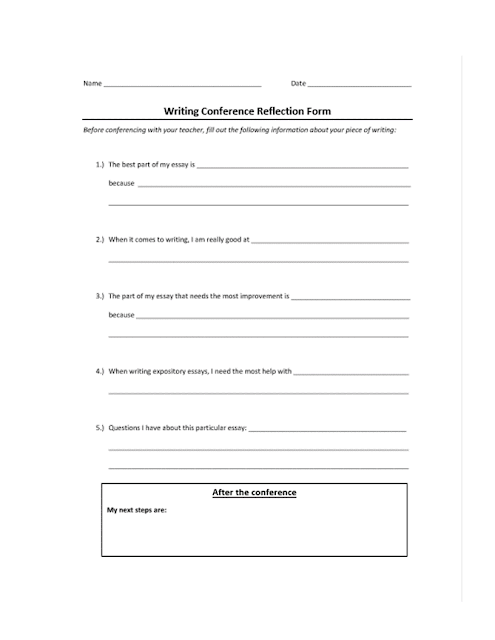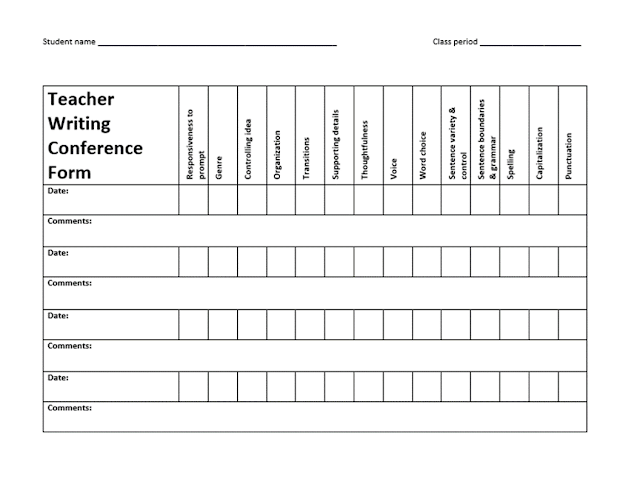The power of writing conferences
Writing conferences have so many benefits. Following is only a partial list of the incredible good that comes from them. One-on-one writing conferences allow the teacher to:* praise and encourage self-doubting writers
* build relationships
* guide students through brainstorming and planning
* answer specific questions
* re-teach writing concepts
* stretch students' imaginations and writing skills
* build students' confidence
* check for understanding and clarify misconceptions
* improve students' discussion skills
* improve students' revising and editing skills
You can probably think of several more benefits of writing conferences. With all of these possibilities, why would anyone not do writing conferences? I mean, how many single lessons do all of these things in one shot?
Types of writing conferences
Whenever I struggled to do writing conferences over the years, the reason always came back to time. Time is a huge factor in any lesson plan, but when you have 25+ students, it can take an entire week to conduct a formal, thorough writing conference with every student. So I improvised. I found that there are three types of writing conferences that I would conduct, depending on each student's needs:Formal conference: This is a formal one-on-one conference lasting 10 minutes (or even more at times) that I would hold with my highest-needs students. It is heavily planned and prepared for. I would do this type of conference after my students had written an essay for our district writing benchmark, I had scored it and written comments on it, and now it was time to confer and have students revise and rewrite to submit as a final draft. The hope was that they would improve their score by going through this process. For this conference, I would want my students to prepare as well. One year, we had a pre-conference form for students to fill out, and I found that it was too complicated and time-consuming, and most of my students didn't even understand what to write. So I have created a simplified one that has the components I think are the most important. You can download it by clicking on the picture:
In the formal conference, you can either sit next to the student at his or her desk, or sit at a designated spot in the room. Either way, it is important to sit next to rather than across from the student, as this is a conversation, not an interview. The student will feel less intimidated this way. I always start with positives by showing the student what she did well on the essay. Then, despite the fact that there may be a million things that need work, I focus on one or two main things I want the student to work on to improve her essay. The goal is an improved essay, not necessarily a perfect essay. I also want the conference to be largely student-led rather than me doing all the talking, so I will start by having the student tell me what she liked and didn't like about her writing. I want to make sure that all of her questions are answered as well. It is important to be very clear about the weaknesses I see (remember, just one or two) and about the improvements I want her to make. Then I'll end by having her clarify and confirm for me what her next steps are, to make sure I see that she understands what she needs to do. There's a spot for that on the form.
At this point, I can either make a copy of her form for my records, or I can keep track of conferences and student progress on my own progress monitoring form (a pretty common one that I adapted to match the 7th-grade STAAR expository rubric):
Small-group conference: Sometimes I need to do a formal conference with some -- or all -- of my students, but there is just not the time to do so (it always comes down to time). So I will pre-plan some small-group conferences. I will go through all of my students' writing and sort them into "target skill" piles. For example, maybe there are three students who did not answer the prompt, so I need to meet with them and break down the prompt with them to help them understand it. Maybe there are four students who wrote in the wrong genre, so I will conference with those four to re-teach a mini-lesson on the elements of expository writing. And maybe there are a few students whose main problem was conventions, so I will meet with them to work on editing strategies. While the small-group conference may last just as long as a formal one-on-one conference, it is saving time because I'm working with three or four students at a time.
So worth it
No matter which type of conference you conduct, I believe you will find the outcome well worth the time spent.Now, when it comes to editing and revising, there are so many different things you can do. I have a product in my TPT store for editing and revising that has gotten tremendous results for me when I used it with my students. It uses an old but apparently little-known method called CDO and works great for small-group instruction. I have created some supplemental aids to go with it, and it's only $2!:



